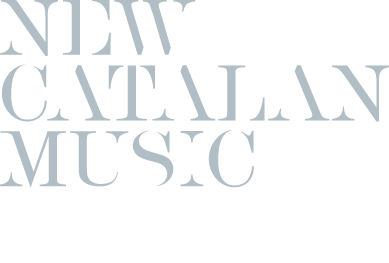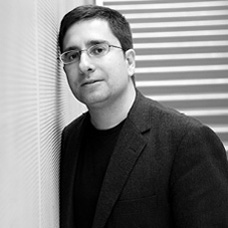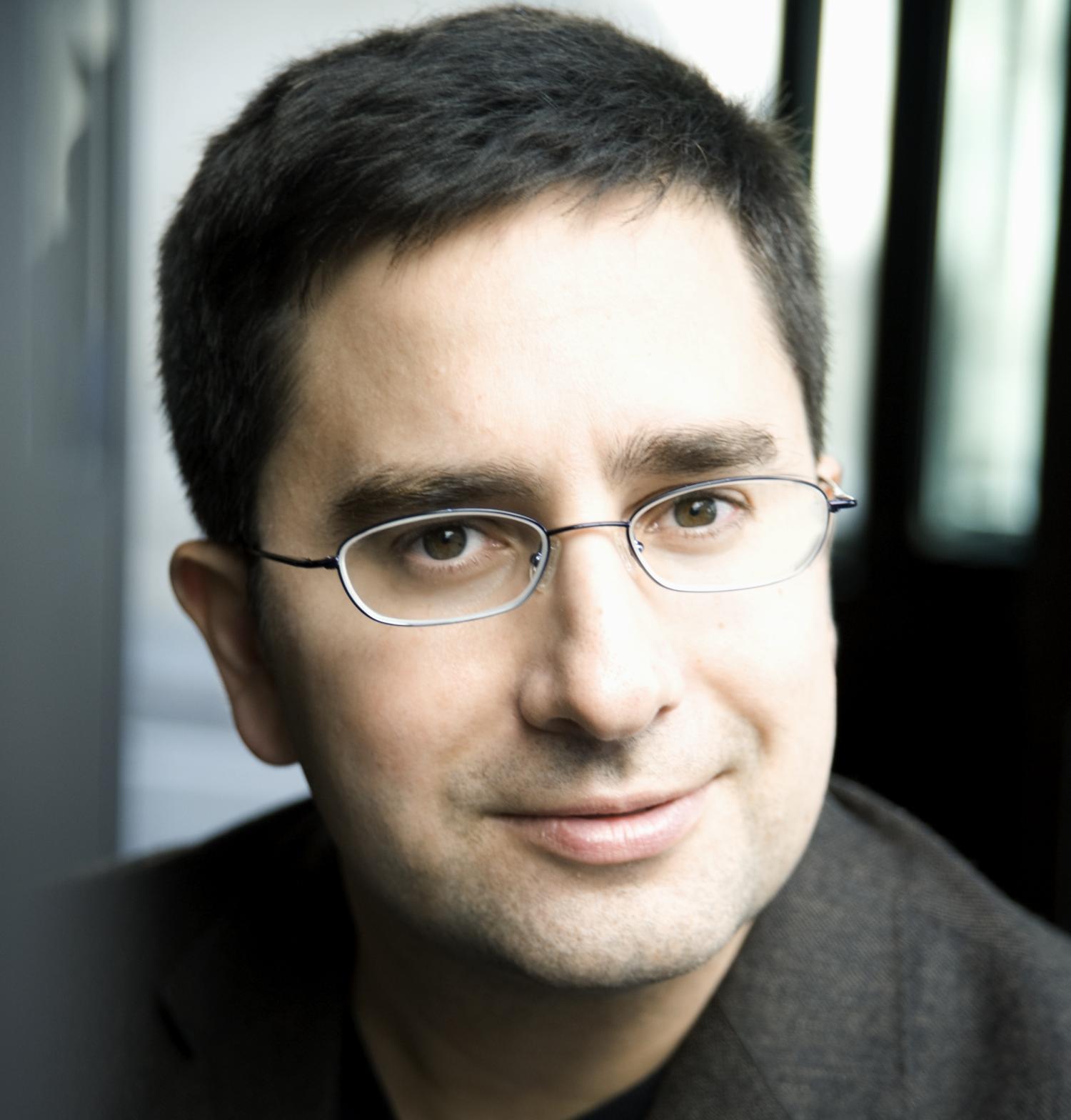Hèctor Parra
Contemporary music
(Hèctor Parra, Barcelona 1976)
Composer and pianist, he is the most internationally acclaimed among the young Catalans. Trained at the Conservatori Municipal de Barcelona, he studied composition with Carles Guinovart, David Padrós, Brian Ferneyhough and Jonathan Harvey. He has also been a student at the Haute École de Musique of Geneva and of Lyon’s CNSMD, with a master in electro-acoustic composition from the Paris VIII University. Currently, he is a resident composer doing research at the IRCAM in Paris and he is preparing his doctoral thesis under the guidance of Horacio Vaggione. Frequently performed in main international forums dedicated to contemporary creation, his works have been premiered by the Ensemble Intercontemporaine, the Arditti Quartet and the orchestras Philharmonic of Lieja and the Nacional d’Île-de-France, among others.
With works of huge and fascinating scope, Parra stands out for the theoretical firmness of his compositional discourse and for his unique continuous search for a new tonal expressiveness, which he derives from electronics to bring it new meaning. An example of the wide variety of gesture in his writing can be found in the works for a large opera Chroma (2004), revised in 2006 and premiered under the new title Abyssales-Chroma I by the Orchestre National d’Île de France with the conductor David Porcelijn, on April 23, 2006, in Paris. Another example would be Karst-Chroma II (2006), premiered during the Festival de Música d’Estrasburg by the Orchestre Philharmonique de Liège, and conducted by Pascal Rophé. His third symphonic creation, InFALL-Chroma III, was commissioned and performed by the Orquestra Simfònica de Barcelona i Nacional de Catalunya (OBC) at the Auditori de Barcelona on February 24, 2012. Lothar Zagrosek conducted this concert, during which they also played Karst-Chroma II. In 2013 he adds a new symphonic work, L'absència, a commission by the Orquestra de Cadaqués for its European Conducting Competition.
Some of his many chamber works include: the brilliant Antigone (2002), a series of four instrumental and vocal pieces for different chamber groups, where the author suggests a reflection on the classic tragedy of Sophocles; the chamber symphonies Quasi Kristall (2005); Fibrillian. Chamber Symphony Nº 2 (2007-2008), premiered at the Warsaw Autumn Festival in September 2008; and Sirrt die Sekunde (2008), performed for the first time on February 14, 2009, in Graz, Austria, by the Klangforum Wien. Another chamber piece worth mentioning is Equinox, which the instrumental group Barcelona 216, conducted by Ernest Martínez Izquierdo, performed in Zaragoza and in Barcelona in November 2010. Also for chamber orchestra are Caressant l’horizon, one of his more extensive and developed scores in the formal and expressive sense, premiered on November 9, 2011, by the Ensemble Intercontemporain, conducted by Emilio Pomárico, at the Grande Salle de la Cité de la Musique –where no other work by a Catalan author had ever premiered– and Moins qu'un souffle, performed for the firs time on October 6, 2012 in Graz, by Klangforum Wien, conducted by Clement Power.
There are some other great examples of an author with great performance demand and extraordinary expressive ambition: Fragments Stries (2004), for a saxophone quartet; the string quartets Leaves of Reality (2006-2007) and Fragments on Fragility (2009), both premiered by the Arditti String Quartet in Valencia and in Witten; the Trio Wortschatten (2004); the series for baritone saxophone Time Fields (2002, for low clarinet, 2004); Impromptu (2005) for piano, and An Exploration of Light, for cello and percussion –commissioned by the Fundació Caixa Catalunya during its exhibit dedicated to Aleksandr Rodtxenko–.
Some of the pieces he has written for vocals are Papa Moe (2000) for soprano and electronics, Arena (2006) for soprano and piano, and Mort d’Antigone (2007) for mezzo and clarinet. He is also the author of L’aube assaillie for cello and electronics and Strette for soprano, electronics, real-time video and stage presence, based on the poem by Paul Celan. There is also Tentatives de Realité (2006-2007), a work connected to an IRCAM research project on the instrumental gesture, in which he collaborated.
His first stage piece Zangezi saw its debut on June 22, 2007. It is a musical for three actors, soprano and electronics, based on a poem by Velimir Khlebnikov. It premiered at the Teatro Albéniz de Madrid and was scheduled for the 2008-2009 season at the Schauspielhaus in Salzburg. His search for a new tonal expressiveness from the use of advanced avant-garde techniques and sophisticated electronic means led hem to create Hypermusique Prologue, a projective opera for soprano, baritone, ensemble and real time electronics. The Ensemble Intercontemporaine premiered this work on June 15, 2009, during the Paris IRCAM season, with vocals from the soprano Charlotte Ellett and the baritone James Bobby, and with Clement Power conducting. The piece is inspired by the theory of the existence of a fifth hidden dimension in the universe, formulated by the Harvard theoretical physics specialist Lisa Randall –author of the libretto-. From this theory, Parra dares to explore new tonal and dramatic dimensions in his lyrical world. Four months later, on November 27, the piece made it to the Foyer of the Gran Teatre del Liceu in Barcelona.
In 2011, Héctor Parra was acknowledged with one of the most prestigious awards in the world of music, the Ernst von Siemens Composers’ Prize, which annually selects three young composers under fifty years old, being the first time ever for a Catalan artist. During the time of this victory, the Ensemble Recherche premiered at the Cuvilliés-Theater in Munich his piece Early Life, for oboe, piano and a string trio, a reflection on the union between man and the universe. Some other awards that endorse his still short yet notable career are: the Earplay Donald Aird Memorial International Composition Prize of San Francisco (EUA) and the Impuls-Klangforum of Graz, both in 2007; the Tremplin de l’Ensemble Intercontemporain (2005); and the composition award from the INAEM (Instituto Nacional de las Artes Escénicas y de la Música) - Colegio de España de París (2002).
His most recent projects include a piano notebook inspired by the work of different contemporary artists, performed during the Festival Nits d’Estiu de Girona and for which two first releases took place: Cos de matèria, a homage to the Catalan painter Antoni Tàpies premiered on July 21, 2012, by the pianist José Menor and Carícies cap al blanc, inspired by a series of six abstract paintings by Gerhard Richter –CAGE-, premiered by Alex Alguacil on July 3, 2013. In November of the same year he was resident composer of the Huddersfield Contemporary Music Festival (UK), which dedicated to him five concerts by groups such as the Arditti String Quartet and the ensemble Barcelona 216. In this context, took place the premiere of Frec, for piano and electronics, a work created in close complicity with his interpreter, the pianist and improviser Agustí Fernández. In this piece the author uses the gestures of the pianist like his main source of inspiration for creating "a new concept of piano beyond the borders of the European tradition and improvised music."
On 4 March 2014 premiered at the Théâtre des Bouffes du Nord in Paris, his third work for the stage, Te craindre en ton absence, a musical monodrama with a libretto by writer and Goncourt Prize Marie NDiaye. Conceived for actress, 12 instruments and electronics the work went up on stage with Astrid Bas, Intercontemporaine Ensemble, musical direction of Julien Leroy and staging of Georges Lavaudant. As May is scheduled the presentation of a second work in collaboration with Ndiaye, chamber opera Das Leben geopferte (2013), a co-production of the Biennial of Munich, the Ensemble Recherche, the Baroque Orchestra of Freiburg and the Freiburg Theater. Two months later, on May 20, and again with the cooperation of Marie NDiaye, presented a new stage creation, the baroque opera Das Leben geopferte (The life sacrificed). The work, that proposes a renovated version of the myth of Orpheus and Eurydice, concluded the Munich Biennale in 2014 and seen again, after a few days in Munich and Freiburg. The interpretation went by the soloists of the Opera Company of Freiburg, Freiburger Barockorchester and the ensemble Recherche and had a staging by Vera Nemirova.





 twitter
twitter flickr
flickr facebook
facebook RSS
RSS spotify
spotify youtube
youtube
